Vanessa Woods
(Gotham)

Since bonobos are altruistic, compassionate, etc., and because they do in public (in the zoo, for instance) everything that the rest of us wish we could be doing in public but don't --- everyone seems to love them. In fact, in the Congo, their only home outside a few zoos, the Congolese love them so much that they are eating them up. It's called, in the vernacular, "bushmeat." The bonobo population there south of the Congo River around Salonga has fallen to perhaps 5,000 but no one knows for sure because these animals have gotten to be, understandably, reclusive.
Vanessa Woods started out chasing chimps but then came to "Lola ya Bonobo" (Bonobo Paradise) not long ago and became infatuated with them. Bonobo Handshake reports on her adventures there in Bonobolandia. She and her husband, Brian Hare, who studies rabbits --- I'm just kidding, he's a primatologist --- set about studying altruism in the world of bonobos.
The key experiment had to do with Semendwa, a female bonobo, being offered a chance to jump on and devour a pile of "papaya, cucumbers, pineapple, and her favorite --- green apples" ... or, instead, to unlock a nearby door for a male bonobo named Kikwit. As Woods reports, "She didn't touch the food ... They didn't have sex. She didn't have a fetish for opening doors."
- Before eating any of the food, Semendwa let in Kikwit so she could share with him.
In later experiments --- with bonobos that she didn't recognize --- she showed similar "altruistic" behavior.

However, to this reader, she is doing it in a rather inverted way. The readers of Bonobo Handshake may expect a delightful romp with primates who are so close to us on the genetic totem-pole. But the author offers dozens of diversions, mostly having to do with the random brutality of humans. We'll be gliding along, kissing Lodja, tickling Tatango, playing with Masisi, feeding Kikwit, or even involving ourselves in a bit of "g-g rubbing" (genito-genital contact, standard foreplay among the bonobos) ... and suddenly Woods is off going on about rape and sexual mutilation and child-murder and Americans shooting unarmed citizens in Viet-Nam.
"For days they watched the Lopori River flow red with blood. Bodies floated down in the hundreds" she tells us (of a local Congolese war). She writes of a "Congolese woman who watched men eat her two daughters in front of her." Even when Woods and Brian move to Chapel Hill, she can't stop:
- Since we arrived in America, two people were shot up the road. Four people have been held at gunpoint in Durham, someone was knifed, several girls were raped, and a student was shot not far from Brian's office.
Men are beasts, Woods is telling us, almost too enthusiastically. Those of us who grew up on newsreels out of Belsen and Hiroshima and Berlin, who studied the battles at Ypres, Gettysburg, Waterloo have known all too long, all too well about villainy and humans. By now most of us have so little doubt of man's inherent cruelty that we don't need to be repeatedly reminded of it. Once or twice would suffice: fifteen or twenty times during the course of a book (I stopped counting half-way through) might come off as a bit of wretched excess.
Obviously Woods has thrown herself into the culture of creatures that have lips to kiss, can be tickled, are able to go into decline over simple heart-break. She may have done this in vain hopes of setting herself free from wretched Homo Sapiens. But honi soit qui mal y pense: bad things come to those who think bad thoughts.
At one point, in a moment of truth, Woods shrewdly observes that she finds herself often "mired in life's ugliness, when I can see only what's decaying both inside and outside my own head."